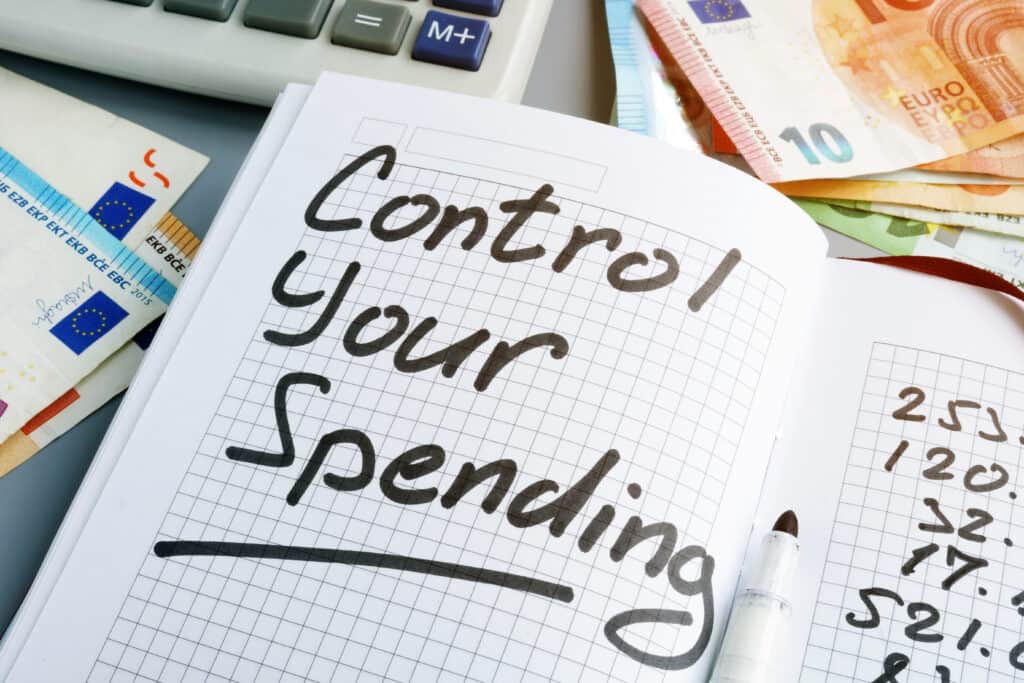If you’re of the mindset that successful budgeting should be easy and painless, you may want to go back to the drawing board. Budgeting isn’t always a pleasant activity, but it can be incredibly effective when done right. After all, with careful budgeting techniques and strategies developed over time, you’ll quickly find yourself in control of your finances rather than at their mercy. Trying to pinpoint where your money is going? Looking for simple ways to start or improve your budget? You’ve come to the right place: I’m here to help break down some essential elements of successful budgeting!
Pro-tip: Want to see your credit score for free and be able to use many financial tools right now? Just click here!

Determine your financial goals and objectives
As individuals, we often encounter challenges in achieving our financial goals. With the constant tug-of-war between wants and needs, it is easy to lose sight of our objectives and end up settling with settling our current expenses. But, that should not be the case. It is important to set financial goals and objectives that are realistic, attainable, and actionable for better budgeting outcomes.
Assess your Current Financial Situation
To determine your financial goals and objectives, you should first assess your current financial situation. Analyzing your income, expenses, debt, and savings gives you an understanding of where you stand financially. This will help you identify the areas that need improvement, the financial agreements you need to re-negotiate, and the potential areas you can cut back on expenses. Having a clear understanding of your present financial situation will provide a solid foundation for developing your financial goals.
Identify your Short-term and Long-term objectives
Short-term and long-term objectives are crucial in setting financial goals. Short-term objectives address your immediate financial concerns that you need to achieve within a year or less. Examples of short-term objectives are building an emergency fund and paying off credit card debts. On the other hand, long-term financial objectives are forward-looking goals that you aim to achieve beyond a year, such as saving for a down payment on a house or building a retirement fund. Identifying your short and long-term objectives will guide you on the steps you need to take to achieve your goals.
Prioritize your Goals
After identifying your objectives, the next step is to prioritize which ones to focus on first. Prioritizing is necessary when you have several financial goals, but insufficient resources to attain them all at once. It is essential to rank your objectives based on the urgency, impact, and feasibility. Your highest priority goals should be those that have the most significant impact on your financial well-being.
Set Specific and Measurable Goals
Setting specific and measurable goals is a crucial step for successful budgeting. Goals must be realistic, attainable, and have a clear definition of success. For instance, instead of making a general goal of saving money, set a specific target like saving $500 per month. This approach will provide a clear focus and a sense of accomplishment when you reach your objectives.
Review and Adjust
Reviewing and adjusting your financial goals and objectives is important to ensure that you remain on track financially. Reviewing your financial progress regularly provides an opportunity to adjust your priorities and make necessary changes to achieve your objectives. You can use a financial planner, budgeting apps, or spreadsheets to measure your progress and financial status.
Track your spending to see where you can cut back
Do you ever feel like your wallet is a black hole sucking up all your cash? Are you constantly running out of money before the end of the month? It’s a common struggle, but fear not, there is a simple solution: tracking your spending. Now I know what you’re thinking, “ugh, that sounds tedious and time-consuming,” but trust me, it’s worth it. By tracking your spending, you’ll see exactly where your money is going and where you can cut back.
Click Here to Check Your Credit Score for Free!
Why tracking your spending is important:
It’s important to track your spending so you can see where your money is going. By doing this, you can identify areas where you can cut back and save money. Small expenses like daily coffee runs or eating out can add up quickly and before you know it, you’re left wondering where all your money went. When you track your spending, you can see exactly where your money is going and adjust accordingly.
How to track your spending:
There are several ways to track your spending, and it’s important to find a method that works for you. Here are a few options:
– Keep track of your expenses in a notebook or spreadsheet
– Use a budgeting app like Mint or YNAB
– Check your bank account and credit card statements regularly
No matter what method you choose, make sure you’re logging every expense, no matter how small.
Analyzing your spending:
Once you’ve been tracking your spending for a few weeks or months, it’s time to analyze your expenses. Categorize your expenses into groups like groceries, utilities, entertainment, etc. This will give you a better idea of where your money is going and where you can cut back. Take a close look at each category and see where you can make adjustments.
Cutting back:
Now that you’ve analyzed your spending and identified areas where you can cut back, it’s time to make some adjustments. This doesn’t mean you have to completely cut out all your expenses, but rather find ways to reduce them. For example, instead of eating out every day, try meal prepping or bringing your lunch to work a few times a week. Another way to cut back is to cancel subscriptions or memberships you’re not using. These small adjustments can add up and help you save money in the long run.
The benefits of tracking your spending:
At the end of the day, tracking your spending has several benefits. Not only will it help you save money, but it will also give you a sense of control over your finances. You’ll be able to make informed decisions about your spending and feel more confident in your financial decisions. Plus, who doesn’t love seeing their savings account grow?
Set an achievable budget for yourself
Managing finances can be a challenging task, especially when it comes to setting a budget. It’s easy to accumulate bills and expenses and lose track of expenditures. Keeping a balanced budget will help you prioritize your expenses and save money. Setting a monthly budget can be intimidating, but it’s attainable. Here are some tips to help you set an achievable budget.
Analyze Your Income and Expenses
Before planning a budget, evaluate your income and expenses. Calculate your monthly income and analyze your necessary expenses such as rent, utilities, food, and transportation. Once you calculate your necessary expenses, figure out where you can cut back. Examine your credit card and bank accounts to analyze expenditure habits. These habits will help identify areas where you can lessen expenses.
Prioritize Your Expenses
After analyzing your income and expenses, prioritize your bills. Monthly necessities should be a priority, including rent, utilities, and food. Then prioritize bills on which you can reduce expenses such as entertainment and dining out. Be mindful of your spending habits and allocate your funds according to your priorities.
Set Your Budget
After identifying your expenses and priorities, set a monthly budget. Calculate a base number for monthly necessities and then allocate funds to each respective expense category. Remember to consider possible emergencies, and always allocate for unexpected expenses.
Track Your Spending
Keeping track of your expenses is critical to successfully sticking within a budget. Keep a separate notebook or download a budgeting app that monitors your spending. Tracking your expenses will help you evaluate expenses that may go over-budget, and you can adjust accordingly.
Be Realistic
Setting an achievable budget means being realistic. It’s crucial to acknowledge expenses that are not fixed, such as entertainment or home improvement. Allocating a realistic amount to your entertainment expenses will help you stick to your budget without overspending.
Make sure to save for the future and unexpected expenses

We’ve all been there – a sudden car repair, a medical emergency or even losing your job unexpectedly. If these scenarios sound all too familiar, then you know just how crucial it is to have an emergency fund. Saving for both the future and unforeseen expenses is a crucial part of successful budgeting. It can be challenging to begin saving, but with this guide, we’ll provide you with some useful tips and tricks to get started.
1. Set realistic goals: One of the most significant mistakes people make when budgeting is setting unrealistic goals for themselves. If you’re just getting started with saving, don’t aim to save an extravagant amount of money each month. Set achievable goals that you can accomplish, so you don’t feel discouraged. Start by saving a small percentage of your monthly income to avoid feeling overwhelmed.
2. Keep track of your expenses: Keeping track of your daily, weekly and monthly expenses is a great way to remain aware of where your money is going. It helps you identify areas where you’re spending more than necessary, so you can cut back on expenses and save more. There are several budgeting apps that you can download to track your expenses and provide you with insights on how to save.
3. Invest your money: Once you’ve established an emergency fund, consider investing your money. It’s a great way to grow your wealth and provides you with an additional source of passive income. Investments like stocks, mutual funds, and real estate require some initial research but can be a great way to increase your wealth in the long run.
4. Cut back on expenses: To save more money, you’ll have to make some sacrifices. Begin by cutting back on non-essential expenses like eating out, buying clothes and gadgets, etc. It might not seem like much, but these small changes can add up over time, giving you more money for emergencies.
5. Make saving a habit: Saving is not a one-time event, and it should become a permanent habit. Make it a priority by automating your savings, which makes it less likely to forget or give up. By setting up automatic transfers from your checking account to your savings account, you ensure you’re saving habitually.
Automate your savings to make it easier to keep on track with your budget
Let’s face it: budgeting is not always easy. It requires discipline, attention to detail, and consistency. And one of the most challenging aspects of budgeting is saving money. Despite our best intentions, it can be hard to put aside a portion of our paycheck every month. But what if there was an easier way? What if you could automate your savings and take the guesswork out of the equation?
Why Automate Your Savings?
The number one benefit of automating your savings is the peace of mind that comes with it. Once you set up a recurring transfer from your checking to your savings account, you no longer have to worry about remembering to save each month. You can focus on other aspects of your budget and trust that your savings account is growing steadily. Furthermore, automation helps to remove the temptation to spend your money impulsively. By removing the possibility of access to your savings account, you’re less likely to dip into it for unnecessary purchases.
Tips for Automating Your Savings
The first step to automating your savings is to determine how much you want to save and how often. Most banks and credit unions offer the option to set up automatic transfers, either weekly, bi-weekly, or monthly. Start with a small amount and gradually increase it over time. That way, you won’t feel overwhelmed or strapped for cash. You can also set up multiple savings accounts for different goals, like an emergency fund or a down payment on a home. This way, you can prioritize your savings and keep track of your progress.
Make Saving Fun and Rewarding
Saving money doesn’t have to be boring or dull. Make it a game and reward yourself for hitting certain milestones. For example, you could create a chart to track your progress or use a savings app to monitor your savings. Each time you reach a goal, treat yourself to something small or splurge on a larger item once you’ve reached your ultimate savings target. The key is to celebrate your accomplishments and remind yourself of the progress you’re making.
Where to Go for Help
It’s okay to seek help when it comes to budgeting and saving. Banking institutions and credit unions typically have resources available to help you create a budget or plan for savings. Online resources are also plentiful, and many free budgeting apps can guide you through the process. Finally, don’t hesitate to reach out to friends or family members who have experience in budgeting or personal finance. Learning from others’ experiences can be a valuable tool in creating and maintaining your budget.
Review your budget regularly and adjust if needed
Managing your finances can be challenging, especially when you’re living paycheck to paycheck. Regardless, having a budget can help you stay on top of your expenses, pay off debt, and achieve your financial goals. However, creating a budget isn’t enough. You must regularly review and adjust it to ensure it aligns with your current income and expenses, and allow you to make smarter financial decisions.
A Budget is Not Set in Stone
Creating a budget is a great way to get started with your finances, but it should never be fixed. Your income and expenses may change over time, and your goals can shift as a result. For example, if you get a raise at work, you may have more money to allocate towards your savings or debt repayment. On the other hand, if you lose a source of income or experience unexpected expenses, you may need to revisit your budget and make some adjustments.
Helps You Identify Areas for Improvement
Reviewing your budget regularly can help you identify areas where you’re overspending and find ways to cut back. For example, if you notice that you’re spending too much on dining out, you can start meal prepping and cooking more meals at home. As a result, you’ll have more money to allocate towards your financial goals. Additionally, reviewing your budget can help you identify areas where you can renegotiate bills, shop around for better deals, and reevaluate your spending habits.
Enables You to Track Your Progress
Regularly reviewing your budget is an excellent way to track your financial progress. It can help you recognize when you’re making progress towards your financial goals and celebrate the small wins. It can also help you stay motivated and keep your eye on the prize. For example, let’s say your goal is to save $1000 per month. After a few months of following your budget, you’ll be able to see how much progress you’ve made towards that goal and adjust your budget accordingly.
Allows You to Adapt to Life Changes
Life is unpredictable, and things can change in the blink of an eye. That’s why it’s important to regularly review and adjust your budget to adapt to life changes. If you’re expecting a baby or planning to buy a house soon, for example, you may need to make some significant changes to your budget to accommodate those life changes. Additionally, reviewing and adjusting your budget can help you plan for future expenses like college tuition, retirement, and emergencies.
Click Here to Buy Stocks and Crypto on eToro!
Helps You Avoid Financial Surprises
Unexpected expenses can be a significant source of stress and anxiety. However, if you regularly review and adjust your budget, you can be better prepared for unexpected expenses. For example, if you notice that your car is starting to have some issues, you can start saving for repairs ahead of time rather than dipping into your emergency fund or using credit cards. Additionally, by reviewing your budget, you can identify areas where you can cut back on expenses and allocate that money towards your emergency fund.
Conclusion:
Creating a successful budget takes time and effort, but it’s an investment in your financial future. By identifying your income streams, setting realistic goals, tracking your expenses, prioritizing your spending, and building an emergency fund, you can build a strong financial foundation that will help you reach your long-term goals. Remember that budgeting is a process, and it’s okay to make adjustments along the way. Stay committed to your financial goals, and you’ll reap the rewards in the long run.
